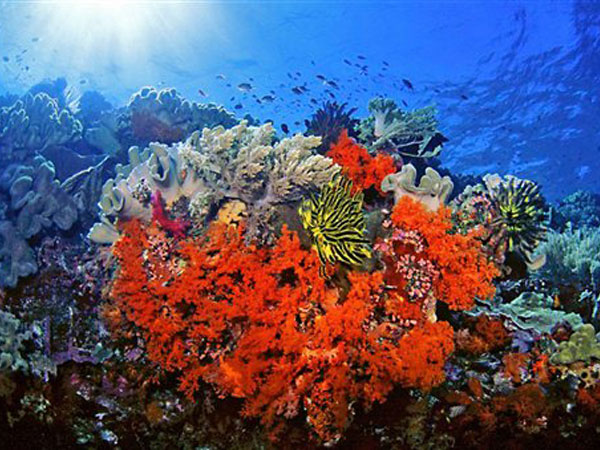Warming report sees violent, sicker, poorer future

This undated handout photo provided by Marinelifephotography.com shows Soft corals, crinoids and associated reef fishes in Southeast Sulawesi, Indonesia. A new study on the timing of climate change calculates the probable dates for when cities and ecosystems across the world would regularly experience never-before-seen hotter environments based on about 150 years of record-keeping. These are the dates when every year is hotter than old hottest annual record. This means the old blistering heat of people’s memories will eventually seem unusually cool in comparison to the warming years to come. AP
WASHINGTON — Starvation, poverty, flooding, heat waves, droughts, war and disease already lead to human tragedies. They’re likely to worsen as the world warms from man-made climate change, a leaked draft of an international scientific report forecasts.
The Nobel Peace Prize-winning Intergovernmental Panel on Climate Change will issue a report next March on how global warming is already affecting the way people live and what will happen in the future, including a worldwide drop in income. A leaked copy of a draft of the summary of the report appeared online Friday on a climate skeptic’s website. Governments will spend the next few months making comments about the draft.
“We’ve seen a lot of impacts and they’ve had consequences,” Carnegie Institution climate scientist Chris Field, who heads the report, told The Associated Press on Saturday. “And we will see more in the future.”
Cities, where most of the world now lives, have the highest vulnerability, as do the globe’s poorest people.
“Throughout the 21st century, climate change impacts will slow down economic growth and poverty reduction, further erode food security and trigger new poverty traps, the latter particularly in urban areas and emerging hotspots of hunger,” the report says. “Climate change will exacerbate poverty in low- and lower-middle income countries and create new poverty pockets in upper-middle to high-income countries with increasing inequality.”
For people living in poverty, the report says, “climate-related hazards constitute an additional burden.”
The report says scientists have high confidence especially in what it calls certain “key risks”:
—People dying from warming- and sea rise-related flooding, especially in big cities.
—Famine because of temperature and rain changes, especially for poorer nations.
—Farmers going broke because of lack of water.
—Infrastructure failures because of extreme weather.
—Dangerous and deadly heat waves worsening.
—Certain land and marine ecosystems failing.
“Human interface with the climate system is occurring and climate change poses risks for human and natural systems,” the 29-page summary says.
None of the harms talked about in the report is solely due to global warming nor is climate change even the No. 1 cause, the scientists say. But a warmer world, with bursts of heavy rain and prolonged drought, will worsen some of these existing effects, they say.
For example, in disease, the report says until about 2050 “climate change will impact human health mainly by exacerbating health problems that already exist” and then it will lead to worse health compared to a future with no futher warming.
If emissions of carbon dioxide from the burning of coal, oil and gas continue at current trajectories, “the combination of high temperature and humidity in some areas for parts of the year will compromise normal human activities including growing food or working outdoors,” the report says.
Scientists say the global economy may continue to grow, but once the global temperature hits about 3 degrees Fahrenheit warmer than now, it could lead to worldwide economic losses between 0.2 and 2.0 percent of income.
One of the more controversial sections of the report involves climate change and war.
“Climate change indirectly increases risks from violent conflict in the form of civil war, inter-group violence and violent protests by exacerbating well-established drivers of these conflicts such as poverty and economic shocks,” the report says.
Pennsylvania State University climate scientist Michael Mann, who wasn’t part of the international study team, told the AP that the report’s summary confirms what researchers have known for a long time: “Climate change threatens our health, land, food and water security.”
The summary went through each continent detailing risks and possible ways that countries can adapt to them.
For North America, the highest risks over the long term are from wildfires, heat waves and flooding. Water — too much and too little — and heat are the biggest risks for Europe, South America and Asia, with South America and Asia having to deal with drought-related food shortages. Africa gets those risks and more: starvation, pests and disease. Australia and New Zealand get the unique risk of losing their coral reef ecosystems, and small island nations have to be worried about being inundated by rising seas.
Field said experts paint a dramatic contrast of possible futures, but because countries can lessen some of the harms through reduced fossil fuel emissions and systems to cope with other changes, he said he doesn’t find working on the report depressing.
“The reason I’m not depressed is because I see the difference between a world in which we don’t do anything and a world in which we try hard to get our arms around the problem,” he said.